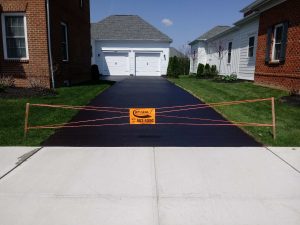Hot Mix Asphalt: A Sustainable Solution for Pavement
Hot Mix Asphalt (HMA) has actually arised as a leading sustainable selection for sidewalk options, offering a myriad of environmental benefits and ingenious technologies. As the demand for eco-friendly construction techniques expands, exploring the nuances of HMA's sustainability can provide useful understandings into the future of sidewalk options.
Ecological Benefits of Hot Mix Asphalt

In Addition, Hot Mix Asphalt aids to mitigate urban heat island results. Its dark shade absorbs sunlight, decreasing the amount of warm reflected back into the ambience compared to lighter-colored pavements. This can decrease ambient temperature levels in urban areas, reducing the demand for air conditioning and eventually minimizing energy intake.
On top of that, Hot Mix Asphalt adds to enhanced stormwater management. Its porous nature enables water to penetrate the pavement and charge groundwater materials, lowering runoff and the threat of flooding. These ecological benefits make Warm Mix Asphalt a sustainable selection for paving highways and roads.
Power Effectiveness in HMA Production
Is energy efficiency an important variable in the manufacturing of Warm Mix Asphalt (HMA)? Absolutely. Power plays a substantial role in the production of HMA, impacting both cost and environmental sustainability. One crucial facet of energy efficiency in HMA manufacturing is using cozy mix asphalt (WMA) innovations (commercial parking lot paving). WMA permits the blending and positioning of asphalt at lower temperatures contrasted to traditional warm mix asphalt, leading to minimized power consumption during manufacturing. This procedure not just lowers fuel use but additionally lowers greenhouse gas emissions, making it a more eco-friendly choice.
Furthermore, improvements in plant modern technologies have actually led to more energy-efficient HMA manufacturing processes. Modern plants are made with attributes like recycled asphalt sidewalk (RAP) handling abilities, reliable burner systems, and boosted insulation, all adding to energy cost savings. By optimizing power usage in HMA production, the sector can decrease its carbon footprint while keeping top quality pavement products. Power performance is, as a result, a critical factor to consider in guaranteeing the sustainability of Warm Mix Asphalt manufacturing.
Recyclability of Warm Mix Asphalt
The recyclability of Hot Mix Asphalt (HMA) is a critical element of its sustainability and long-lasting ecological effect. HMA is one of one of the most recycled products in the United States, with over 100 million lots of redeemed asphalt sidewalk (RAP) being reused each year in brand-new pavement building and construction. Reusing HMA provides several ecological advantages, such as minimizing the need for virgin products, lowering energy usage throughout manufacturing, and lowering the quantity of waste sent to landfills.
The procedure of reusing HMA entails milling the existing sidewalk, crushing it into smaller items, and mixing it with brand-new accumulation and asphalt binder to produce a recycled mix. This recycled mix can commonly execute as well as or perhaps much better than conventional HMA, while needing less basic materials and creating reduced greenhouse gas discharges. By including RAP right into brand-new sidewalk jobs, road agencies can preserve all-natural sources, lower prices, and decrease the ecological footprint of roadway construction and maintenance activities. On the whole, the recyclability of HMA plays a considerable duty in advertising lasting methods within the pavement industry.

Long-Term Efficiency of HMA
Asphalt pavements show longevity and resilience over an extensive duration, mirroring the lasting performance of Hot Mix Asphalt (HMA) Furthermore, advancements in HMA technology, such as the usage of find polymer-modified binders and cozy mix asphalt, have actually further boosted the longevity and longevity of HMA pavements. By prioritizing quality building and construction and maintenance methods, HMA continues to verify itself as a sustainable and cost-efficient remedy for long-lasting sidewalk framework.

HMA: Durability and Sustainability
Demonstrating both durability and sustainability, Warm Mix Asphalt (HMA) has actually ended up being a foundation in the construction of long-lasting sidewalk infrastructures - angled parking. HMA's sturdiness comes from its ability to withstand hefty tons, harsh weather, and high web traffic quantities, making it a trusted selection for roads, highways, and flight terminal runways. The composition of HMA, which typically includes accumulations, binder, and filler, plays a vital role in enhancing its durability and resistance to tear and use
In addition, HMA's sustainability lies in its recyclability and energy-efficient manufacturing process. The capability to reuse recovered asphalt sidewalk (RAP) in new HMA blends reduces the need for virgin materials and minimizes the ecological effect of pavement construction and upkeep. Additionally, the power efficiency of creating HMA depends on its reduced blending temperatures contrasted to other sidewalk products, leading to minimized power intake and greenhouse gas exhausts.
Final Thought
In final thought, warm mix asphalt (HMA) supplies a sustainable service for sidewalk with its eco-friendly characteristics. HMA's recyclability, power efficiency in production, and long-lasting longevity make it an environmentally friendly selection for roadway building. By saving natural deposits, decreasing waste, and lowering greenhouse gas emissions, HMA plays a crucial role in Click Here promoting sustainability in facilities development. Its ability to minimize urban warmth island results additionally highlights its value in creating resilient and environmentally aware sidewalk systems.
HMA is one of the most recycled products in the United States, with over 100 million bunches of redeemed asphalt sidewalk (RAP) being reused each year in new pavement building.The process of recycling HMA involves crushing the existing pavement, squashing it right into smaller items, and mixing it with new accumulation and asphalt binder to develop a recycled mix.Asphalt pavements demonstrate resilience and durability over a prolonged duration, showing the long-term efficiency of Hot Mix Asphalt (HMA) Additionally, innovations in HMA modern technology, such as the use of polymer-modified binders and warm why not try these out mix asphalt, have additionally improved the toughness and durability of HMA pavements. The capability to recycle redeemed asphalt sidewalk (RAP) in brand-new HMA mixtures lowers the demand for virgin products and decreases the ecological influence of sidewalk construction and upkeep.